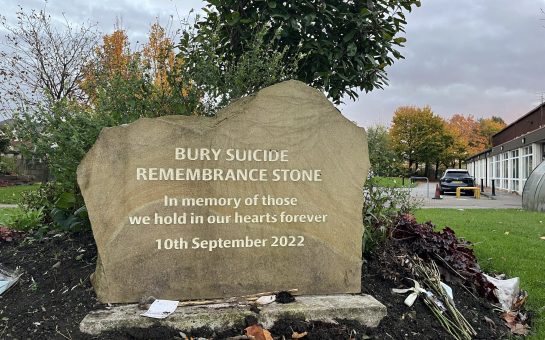A suicide prevention strategy to help people feeling emotionally overwhelmed has been launched today in an attempt to reduce the number of deaths in Manchester.
Manchester Mental Health and Social Care Trust have launched their initiative to coincide with the 11th World Suicide Prevention Day.
World Suicide Prevention Day was jointly set up by the International Association for Suicide Prevention and the World Health Organisation to break down the silence associated with suicides as well as raise awareness for help that is available.
Honorary Consultant Professor Navneet Kapur, one of the UK’s leading experts in suicide research and Professor of Psychiatry and Population Health at The University of Manchester, has helped to produce the strategy in an attempt to lower the number of deaths.
“It is important to remember that suicide isn’t inevitable. Many people just want the pain and distress to stop,” said Prof Kapur.
“People who feel suicidal are often struggling with overwhelming and intense emotions and may feel that the situation is hopeless and there is no other option.
“We have high rates of suicide and self-harm in the city and prevention needs to focus on general approaches such as improving care for the most vulnerable patients or reducing access to potentially dangerous methods of harm.
“The strategy also discusses more specific measures locally, for example making sure inpatient units are as safe as they can be and providing high quality care for people who have self-harmed.“
The new strategy will implement a crisis centre aptly named The Sanctuary delivering a 24 hour service to help those suffering from anxiety, depression, panic and suicidal thoughts run by Charity Self Help Services.
Burt Burtun, Manchester Trust’s Risk Manager and co-author of the strategy, said: “This local strategy has been developed in response to the Preventing Suicide in England strategy which the Government launched last year,”
“It takes on board the data from the Office for National Statistics 2011 and the National Confidential Inquiry into Suicide and focuses on suicide and suicidal behaviour in relation to the local context.
“We have consulted with various stakeholders in the production of this version of the document, however it will evolve as we will continue to act on feedback we receive and further research information as it becomes available.”
As well as the centre, the strategy will educate people on suicide and remove the label that people who take their own life are ‘attention seeking’
“Suicide attempts might sometimes be labelled as ‘attention-seeking behaviour’, but they are very real indicators of distress and risk of suicide in the future,” said Prof Kapur.
“Someone who presents to hospital with self-harm – for example by taking an overdose of medicines or cutting themselves – is 100 times more likely to die by suicide over the next twelve months than someone who hasn’t. We need to continue to tackle the stigma around self-harm and suicide and this strategy will no doubt help achieve that.”
If you or someone you care about is feeling suicidal then help is available. You can contact NHS Direct on 0845 46 47, or the Samaritans on 08457 90 90 90. Both services are available 24 hours a day.
Image courtesy of Alex E Proimos via Flickr, with thanks.
For more on this story and many others, follow Mancunian Matters on Twitter and Facebook.



